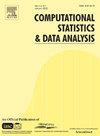A debiasing phylogenetic tree-assisted regression model for microbiome data
IF 1.5
3区 数学
Q3 COMPUTER SCIENCE, INTERDISCIPLINARY APPLICATIONS
引用次数: 0
Abstract
Identifying associations between microbial taxa and sample features has always been a worthwhile issue in microbiome analysis and various regression-based methods have been proposed. These methods can roughly be divided into two types. One considers sparsity characteristic of the microbiome data in the analysis, and the other considers phylogenetic tree to employ evolutionary information. However, none of these methods apply both sparsity and phylogenetic tree thoroughly in the regression analysis with theoretical guarantees. To fill this gap, a phylogenetic tree-assisted regression model accompanied by a Lasso-type penalty is proposed to detect feature-related microbial compositions. Specifically, based on the rational assumption that the smaller the phylogenetic distance between two microbial species, the closer their coefficients in the regression model, the phylogenetic tree is accommodated into the regression model by constructing a Laplacian-type penalty in the loss function. Both linear regression model for continuous outcome and generalized linear regression model for categorical outcome are analyzed in this framework. Additionally, debiasing algorithms are proposed for the coefficient estimators to give more precise evaluation. Extensive numerical simulations and real data analyses demonstrate the higher efficiency of the proposed method.
微生物组数据的去偏系统发育树辅助回归模型
在微生物组分析中,识别微生物分类群与样品特征之间的关联一直是一个有价值的问题,人们提出了各种基于回归的方法。这些方法大致可分为两类。一种在分析中考虑微生物组数据的稀疏性特征,另一种考虑系统发育树来利用进化信息。然而,这些方法都没有在有理论保证的回归分析中充分应用稀疏性和系统发育树。为了填补这一空白,提出了一种带有lasso型惩罚的系统发育树辅助回归模型来检测与特征相关的微生物组成。具体而言,基于两种微生物物种之间的系统发育距离越小,其在回归模型中的系数越接近的合理假设,通过在损失函数中构造laplace型惩罚,将系统发育树纳入回归模型。在此框架下对连续结果的线性回归模型和分类结果的广义线性回归模型进行了分析。此外,还提出了系数估计器的去偏算法,以获得更精确的估计。大量的数值模拟和实际数据分析表明,该方法具有较高的效率。
本文章由计算机程序翻译,如有差异,请以英文原文为准。
求助全文
约1分钟内获得全文
求助全文
来源期刊

Computational Statistics & Data Analysis
数学-计算机:跨学科应用
CiteScore
3.70
自引率
5.60%
发文量
167
审稿时长
60 days
期刊介绍:
Computational Statistics and Data Analysis (CSDA), an Official Publication of the network Computational and Methodological Statistics (CMStatistics) and of the International Association for Statistical Computing (IASC), is an international journal dedicated to the dissemination of methodological research and applications in the areas of computational statistics and data analysis. The journal consists of four refereed sections which are divided into the following subject areas:
I) Computational Statistics - Manuscripts dealing with: 1) the explicit impact of computers on statistical methodology (e.g., Bayesian computing, bioinformatics,computer graphics, computer intensive inferential methods, data exploration, data mining, expert systems, heuristics, knowledge based systems, machine learning, neural networks, numerical and optimization methods, parallel computing, statistical databases, statistical systems), and 2) the development, evaluation and validation of statistical software and algorithms. Software and algorithms can be submitted with manuscripts and will be stored together with the online article.
II) Statistical Methodology for Data Analysis - Manuscripts dealing with novel and original data analytical strategies and methodologies applied in biostatistics (design and analytic methods for clinical trials, epidemiological studies, statistical genetics, or genetic/environmental interactions), chemometrics, classification, data exploration, density estimation, design of experiments, environmetrics, education, image analysis, marketing, model free data exploration, pattern recognition, psychometrics, statistical physics, image processing, robust procedures.
[...]
III) Special Applications - [...]
IV) Annals of Statistical Data Science [...]
 求助内容:
求助内容: 应助结果提醒方式:
应助结果提醒方式:


